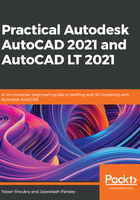
Understanding the user interface
AutoCAD 2021, just like its predecessors, has a ribbon view with panels and tabs. You can launch the AutoCAD software using its icon on the desktop or from the AutoCAD 2021 – English folder in the start menu. When the software starts up, you will see an interface like this:

Here, we have three columns: Get Started, Recent Documents, and Notifications. Get Started has all the options you will need to start a new drawing or open an existing one. The Recent Documents column shows a list of all the recently opened drawings and you can use this tab to directly open any drawing. The Notifications column has information related to your account, such as an update notification and A360 account notifications. A360 is the cloud-based storage provided by Autodesk with an AutoCAD subscription and apart from cloud storage, you also get many other features, such as collaboration, markups, and rendering, on the A360 cloud account.
To start a blank drawing template, click on the Start Drawing box in the Start tab. Clicking on this box launches the default template listed under the Templates list. By default, a acad.dwt or acadiso.dwt template will be used to open the drawing. These templates contain settings such as units, limits, and precision and at this point, selecting any of these templates won't make a difference as we will learn about making templates and using them in drawings later in this book:

So, when the blank drawing loads up, your interface will look similar to the start screen, but this time with an active ribbon and blank drawing area. Let's talk about all the components in this workspace:

The user interface parts are labeled in figure 1.3, and here is a short description of each of the parts mentioned in this screenshot.